| Author | Message | ||
| jazzyvee
Senior Member Username: jazzyvee Post Number: 4828 Registered: 6-2002 |
Last week I bought a TC Electronic Polytune clip tuner. It seems to work really well on guitars and bass except my Series I shorty and only on the E string. When I play the open E- string it shows "E" for a split second then shows the note "B" as long as the note sustains. However if I play a harmonic or note at the 12th it shows "E" and if I play the note 'E" on any other place on the bass it shows correctly. Is this something to do with the harmonics being more predominant on that string? Could it be the strings are old? I've had the bass a month and a half now and the bass still has the strings on that It came to me with so I have no idea what strings are on the bass or even how long they have been on the bass. | ||
| flpete1uw
Senior Member Username: flpete1uw Post Number: 595 Registered: 11-2011 |
Jazzy, I use the Planet Waves clip on's on my basses. They work pretty well but they are a bit of a "black art" to get to work consistently. Couple of things to try is play around with the location of where its clipped on to head stock, you'd be surprised. Another habit I got into is being that these units sample roughly every ~1/2 second wait until it settles before you hit the note again. So hit note adjust wait till settled repeat. Usually I find the D and G strings work well A and E need some playing around with. Also sometimes I will A/B with a portable plug in tuner if questionable. I find the clip on's work pretty well even when checking with harmonics. Hope this helps some, Pete | ||
| ed_zeppelin
Advanced Member Username: ed_zeppelin Post Number: 212 Registered: 2-2010 |
David Fung's post in this thread explains a lot about tuners. (Thanks to Dave Houck for enshrining it in the "must reads" section.) | ||
| edwin
Senior Member Username: edwin Post Number: 2158 Registered: 5-2002 |
I've been through a lot of tuners. Most of the inexpensive ones still leave you out of tune. The Sonic Research Turbo Tuner seems like the top of the heap, followed by the Peterson tuners. The best bargain is probably the Peterson iStrobotuner iPhone app at around $10. All of the above are very quick and very accurate. When the bass is out of tune, the whole band is out of tune. | ||
| lbpesq
Senior Member Username: lbpesq Post Number: 6302 Registered: 7-2004 |
+1 on the Sonic Research. I have one on my pedalboard. The relatively new TC Electronics Polytone Clip is cool, though the polytone readout doesn't always match the individual string readout. And, after using it for a month, I find the polytone ability to be interesting but an unnecessary gimmick. My favorite clip-on is the Peterson Stroboclip. I also read somewhere that, when tuning, you should pluck the string above the 12th fret to get a purer tone with less overtones. This does seem to work for me. Bill, tgo | ||
| bigredbass
Senior Member Username: bigredbass Post Number: 2520 Registered: 9-2002 |
BOSS TU-80: Cheap, reference pitches, metronome, goes to low B, chromatic or presets for guitar or bass(es), 'over/under' red LCD's, takes AA's. IF it had a backlit LCD, it would be perfect. Joey | ||
| hammer
Senior Member Username: hammer Post Number: 822 Registered: 9-2009 |
I use the Peterson Stroboclip and I really like it. No difficulties using it with my 4-string basses as I've found what appears to be the sweet spot on each headstock as far as placement goes. However, I have found it doesn't work quite as well with the 6-string Europa where placement options are quite limited. I also did read in someone's post on tuners about using the 12th fret and have been doing that ever since. Seems to work well for me. | ||
| stephenr
Intermediate Member Username: stephenr Post Number: 153 Registered: 9-2014 |
I use the Peterson StroboFlip. Would like to try the Peterson clip-on tuner. I have a cheap clip-on tuner to use for convenience but wouldn't trust it to use on stage. | ||
| pierreyves
Senior Member Username: pierreyves Post Number: 1274 Registered: 11-2006 |
I use the easy, simple, cheap Korg pitchblack rack mounter: http://www.korg.com/us/products/tuners/pitchblack_pro/ | ||
| gtrguy
Senior Member Username: gtrguy Post Number: 973 Registered: 9-2004 |
A lot of tuners don't seem to like to track the low notes on a bass. It can be a real pain, especially for 5 and 6 string bass owners. I often have to use the harmonic to be able to use several tuners that I own on bass low notes. Of course, the bass needs to be strobed in well for the harmonic to work like that. I have a Korg DTR-1 rack mount, a Korg DT-10 floor unit, a Boss TU-3 is on my guitar pedal board, and I have an old tube-power Peterson strobe tuner. All of them are hard to read on the bass low notes. I am surprised some company has not invented a tuner just for bass that addresses this issue. | ||
| jalevinemd
Senior Member Username: jalevinemd Post Number: 1068 Registered: 12-2003 |
Bill, When you say "above the 12th fret" do you mean directly over it or anywhere between frets 13 and the end of the neck? | ||
| sonicus
Senior Member Username: sonicus Post Number: 4671 Registered: 5-2009 |
My little sweet KORG GA-40 works well for me . I also have an old SABINE RT-1601 rack tuner that works well . Wolf | ||
| lbpesq
Senior Member Username: lbpesq Post Number: 6303 Registered: 7-2004 |
Jonathan: Right over #12, though I don't think it makes a huge difference if you are a little in front of or behind it. I used to have a Boss stompbox tuner (TU-2?), until I played an outdoor gig in bright sunlight and couldn't see the readout. Bill, tgo | ||
| hankster
Senior Member Username: hankster Post Number: 425 Registered: 6-2004 |
My TC Electronics amp has a built in tuner, and the remote footswitch has a digital readout for the tuner, which is great. Very accurate tuner, or so it seems to these old ears. I've used various clip-ons at various gigs and sessions when I don't have my own amp (as few as possible of those!) and found the Korg to be pretty good. | ||
| ed_zeppelin
Advanced Member Username: ed_zeppelin Post Number: 215 Registered: 2-2010 |
"Equal Temperament" (dividing the octave into twelve equally spaced notes) was invented by a Chinese prince named Zhu Zaiyu in 1580. He built this instrument with 12 strings to use to tune the other instruments in the Imperial Orchestra. This is the world's first tuner: 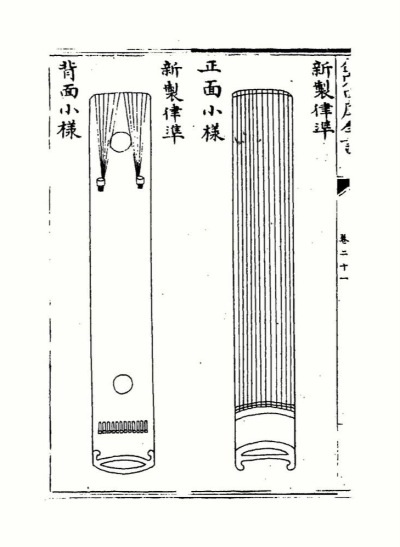 Here are some various methods of solving the shortcomings of equal temperament. TrueTemperament.com 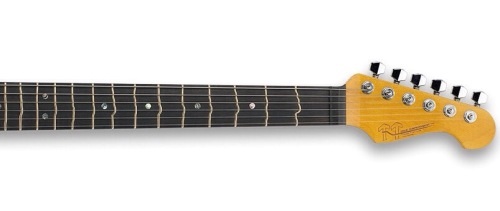 That G string really jumps out at you, doesn't it? In fact, Jimmy Johnson was just talking about a dead spot on the G string. There ya go. A picture is worth ... Buzz Feiten's tuning system relies on a "shelved nut" to compensate for the weirdness in the G and B strings (it really wasn't until Anders Thidell created the True Temperament fingerboard that we could see how out of whack frets actually are): 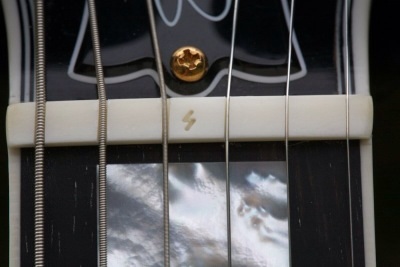 Earvana uses a similar approach: 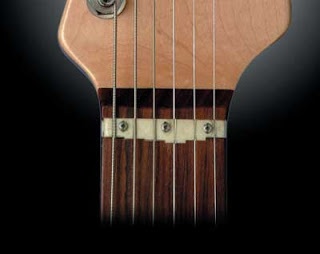 A homemade solution: 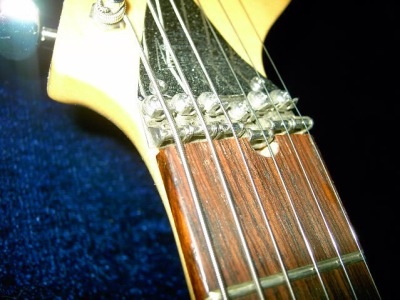 Personally, I think the best solution would be a combination of True Temperament's wiggly frets and Novax slanted frets:  Lastly, I'd like to quote a section from the True Temperament FAQ:
| ||
| paulman
Senior Member Username: paulman Post Number: 465 Registered: 2-2005 |
I was looking for something totally different, and came across this...hope it adds to the discussion. Micro-frets (looks crazy!) https://www.youtube.com/watch?v=iRsSjh5TTqI | ||
| ed_zeppelin
Advanced Member Username: ed_zeppelin Post Number: 216 Registered: 2-2010 |
That's exactly what Anders Thibell's prototype guitars were like: 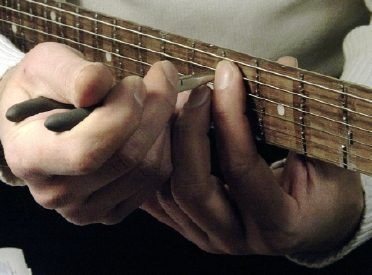 His guitar had 56 micro frets! And that was just to the octave/12th fret. The wiggly fret thing (I call 'em "Dali frets") came about as a compromise, and a vastly more efficient means of producing the guitars commercially. This article on tuning the guitar by Thidell's business partner is one of the best explanations of the problems with guitar tuning I've ever read. Ironically, I've always played fretless, so I pay absolutely no attention to tuning  My interest in temperament comes from playing with a percussionist from India who said that to a musician trained in (microtonal) classical Indian music, all western music sounds like an oompa band, completely lacking in the subtleties inherent in having twice as many notes in the octave. Indian music has 24 steps to the octave, whereas we have 12, and Justin Bieber uses 3 ("we learned a new chord for the album, called a "G." We like it a lot, and hope to use it on tour someday, 'cuz yo, chicks dig it!") My interest in temperament comes from playing with a percussionist from India who said that to a musician trained in (microtonal) classical Indian music, all western music sounds like an oompa band, completely lacking in the subtleties inherent in having twice as many notes in the octave. Indian music has 24 steps to the octave, whereas we have 12, and Justin Bieber uses 3 ("we learned a new chord for the album, called a "G." We like it a lot, and hope to use it on tour someday, 'cuz yo, chicks dig it!") (Message edited by Ed_zeppelin on December 24, 2015) | ||
| edwardofhuncote
Senior Member Username: edwardofhuncote Post Number: 741 Registered: 6-2014 |
All those whoppy-jawed (yeah - it's a real word here in Virginia) frets made me get emotional. And the squiggly ones just scared the crap out of me. I prefer continuously fretted basses... ask Ms. W. =) Hey Jazzy, when using the clip-on tuner, try tuning using the 7th fret harmonic. I've had more success with this variety "hearing" that note better. Disclaimer: I don't own an electronic tuner, just an old A tuning fork I use in the shop, but I do play with a deeply gifted guitarist, who tunes obsessive-compulsively. | ||
| 5a_quilt_top
Junior Username: 5a_quilt_top Post Number: 39 Registered: 6-2012 |
You can tune a piano, but you can tuna...oh never mind. Another quirk of stringed instruments is the affect of the amount of finger pressure applied to the string - the harder the pressing and higher the action = more out of tune the note will be. High frets and scalloped fretboards also require a lighter touch. Also if the strings are inadvertently bent while being pressed to the fretboard, this will have the same affect. I once played with a guitarist who had a death grip of iron - he actually pulled the neck of his guitar toward his body when he played - ! And he wondered why he was always out of tune. | ||
| edwin
Senior Member Username: edwin Post Number: 2163 Registered: 5-2002 |
David, the Turbo Tuner and Peterson tuners all handle low B strings with no issues at all. | ||
| charles_holmes
Senior Member Username: charles_holmes Post Number: 457 Registered: 3-2009 |
I use the Peterson Stroborack at home in my studio & I use the Peterson Stroboplus HD on gigs. I think that Peterson makes a clip-on too. | ||
| lbpesq
Senior Member Username: lbpesq Post Number: 6306 Registered: 7-2004 |
Accuracy specs on tuners: Boss TU-2 ........................... +/- 3 cents Boss TU-3 ........................... +/- 1 cent All Peterson's (including Stroboclip).............. +/- .1 cent TC Electronic Polytone ........... +/- .1 cent Sonic Research Turbo Tuners .. +/- .02 cents 'nuff said. Bill, tgo | ||
| bigredbass
Senior Member Username: bigredbass Post Number: 2523 Registered: 9-2002 |
Well, I can see I got to rush out and get one of those SRT tuners: The difference in +/- 3% and +/- 2/100 of 1% is giving me headaches . . . . kidding aside, the crazy thing is I know two people with perfect pitch that can probably hear that. Joey | ||
| keith_h
Senior Member Username: keith_h Post Number: 2335 Registered: 2-2005 |
In my younger years I knew a woman who was a professor of music at Northwestern University. She had perfect pitch and you could occasionally see her cringe at notes that sounded just fine to the rest of us. The funny thing was she liked Bob Dylan's singing voice. Go figure. As far as accuracy goes I think 1 cent is more than adequate and is more accurate than average folks can hear. It should also be accurate enough for the average trained ear. If you are playing in a loud band I would hazard 2 or 3 cents is adequate. This is another area where you can pay for spec's that are way beyond the average person or musicians ability to hear. The question is a personal one of whether the extra money is really worth something you can only measure. Personally I would be more concerned about road worthiness over it having 2 cent, 1 cent or better accuracy. That being said my Boss TU-12 is spec'ed at +/- 1 cent and I've always found it adequate for tuning my basses and guitars. Keith | ||
| edwin
Senior Member Username: edwin Post Number: 2166 Registered: 5-2002 |
I don't have perfect pitch, and I hear it. +/- 1 cent is very audible to me and makes it sound like the whole band is out of tune. To my ear. I've never gotten any complaints, though. Hm. | ||
| lbpesq
Senior Member Username: lbpesq Post Number: 6307 Registered: 7-2004 |
I agree that there is a point of diminishing returns. The most important factors to me are visibility, both in very bright and very dark environments, ease of use, and roadworthyness (is that actually a word?) While I certainly wouldn't go pay another $100+ to replace a +/- .1 cent with a +/- .02 cent tuner, I would (and did) to replace a Boss TU-2 that I couldn't see in sunlight. And if I were in the market for a new tuner, I would certainly go with the most accurate that fits my other requirements. The Sonic Research ST-200 that I have is built like a tank. Also, the Sonic Research is a true strobe, not just an LCD virtual strobe, and is the fastest tuner at recognizing and reacting to the played note. The new ST-300 series is supposed to be even faster and brighter. Bill, tgo | ||
| keith_h
Senior Member Username: keith_h Post Number: 2336 Registered: 2-2005 |
"roadworthyness (is that actually a word?)" roadworthyness isn't but roadworthiness is.  Keith | ||
| lbpesq
Senior Member Username: lbpesq Post Number: 6309 Registered: 7-2004 |
Damn spellcheck! hehehehe Bill, tgo | ||
| lidon2001
Senior Member Username: lidon2001 Post Number: 559 Registered: 4-2005 |
I happened to be in the market for a tuner and just received the ST-300. Very nice, well worth it. Thanks for the info to Bill and everyone. | ||
| lbpesq
Senior Member Username: lbpesq Post Number: 6310 Registered: 7-2004 |
Tom: Did you get the mini, or is the full size one out? Bill, tgo | ||
| lidon2001
Senior Member Username: lidon2001 Post Number: 560 Registered: 4-2005 |
I got the mini. I recently joined a band and was looking for something a bit more portable than my old Peterson VS-II. The display is very bright (almost too bright?). And it does seem pretty quick to get the note. I don't own a low B so I can't comment on that use. Great tuner. | ||
| flpete1uw
Senior Member Username: flpete1uw Post Number: 599 Registered: 11-2011 |
The Sonic Research ST300 looks intriguing, however the fact that you need external power makes it a bit cumbersome, being that I do not use a pedal board. It looks like the ST-200 with battery power is no longer in production. I do hear rumor of a battery powered ST-300? No major need at the moment but I would love to get one some day. Hope the rumors are true on the ST-300 battery unit. Pete | ||
| moongerm
Advanced Member Username: moongerm Post Number: 329 Registered: 8-2013 |
And if anyone happens to have an Eventide H9 effects unit in their signal path there is a tuner inherent: http://www.youtube.com/watch?v=x1ZcGEu3uuU | ||
| lbpesq
Senior Member Username: lbpesq Post Number: 6311 Registered: 7-2004 |
Musician's Friend's "Stupid Deal of the Day" today is the Korg Pitchblack Portable Polyphonic Tuner for $24.99. (Regularly $100). A great deal on a tuner that is +/- .1 cent accurate. Bill, tgo | ||
| s_wood
Senior Member Username: s_wood Post Number: 403 Registered: 5-2002 |
Love the Sonic Research Turbo Tuner. Mine is the ST-200, which uses a 9 volt battery. It has been out of production for a few months but its still easily found for sale on the web. It tracks well and quickly. The Peterson Classic Stomp Strobo tuner is great, too, but I stopped using it because it's 2x the size and weight of the ST-200. | ||
| flpete1uw
Senior Member Username: flpete1uw Post Number: 600 Registered: 11-2011 |
Stupid deals of the day? I'm in! For $25 you can't go wrong! Thanks Bill ! Pete | ||
| tomhug
Advanced Member Username: tomhug Post Number: 208 Registered: 7-2008 |
Thanks for mentioning the Korg being the Stupid Deal of the Day, Bill, tgo. I've been pretty happy with the Snark SN-8 Tight tuners, even on my basses with B-Strings. They're very affordable - ~ $15.00 US. But the Korg looks interesting, and for $25.00, a bargain. | ||
| smokin_dave
Senior Member Username: smokin_dave Post Number: 442 Registered: 10-2002 |
That is a great deal.If I didn't already have a Korg Pitchblack rackmount I would jump all over that.Any one who needs a quality tuner should grab this up. | ||
| flpete1uw
Senior Member Username: flpete1uw Post Number: 604 Registered: 11-2011 |
Just received my "stupid deal of the day" Korg Pitchblack tuner. Interestingly enough it looks like my bass was setup right already. Intonation perfect and it looks like my other tuners line up nicely with the new accurate Korg. This looks like it will make a nice tool for setups and the polyphonic tuning will make for some interesting conversations. Pete | ||
| rv_bass
Intermediate Member Username: rv_bass Post Number: 169 Registered: 8-2014 |
I compared these three tuners, they all seemed to agree pretty well. The Seiko with needle was fastest, although harder to read in low light. 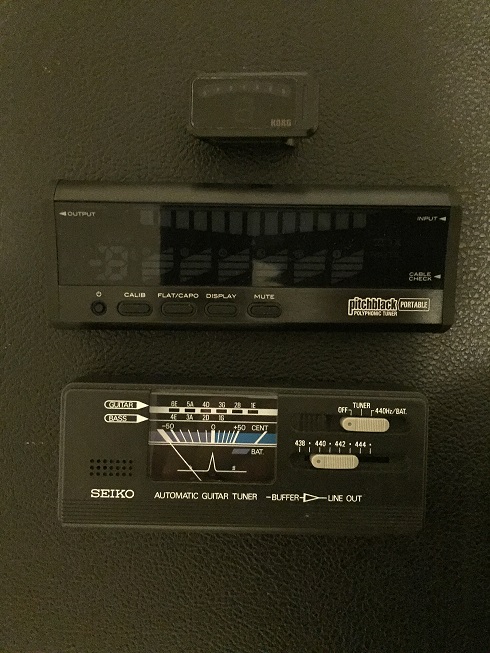 |